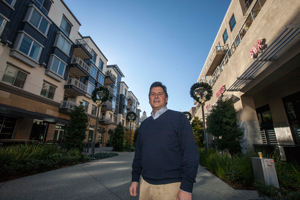Long Beach businesses are in a tough spot.
Just weeks after the Long Beach City Council passed a hike in the minimum wage to $13 an hour by 2019 with a pathway to $15 an hour two years later, that same council placed a measure on the June ballot to hike the sales tax by one percentage point to 10 percent.
If a majority of voters approve, the sales tax would be the highest in Los Angeles and Orange counties, matching the rate in La Mirada, Pico Rivera and South Gate.
The tax, though, could be temporary: It would add that one percentage point to the existing 9 percent sales tax rate for six years, then it would drop by a half-percentage point for four years before sunsetting in 2026.
The additional tax revenue would flow to the city’s general fund; as such, the money can legally be spent on any city services. But backers, including Mayor Robert Garcia, say the money would go exclusively to augment budgets for police, fire and road/infrastructure repair services and inserted a provision for an oversight committee to ensure this. A recent city report noted Long Beach’s infrastructure needs more than $2.8 billion worth of upgrades and repairs, and that figure is growing every year.
Business groups traditionally have decried tax increases. Yet business groups in Long Beach have not rushed to oppose this one, saying they plan to take their time to consider its merits.
“When this sales-tax hike first was presented as an option to us, there was cautious optimism among the downtown business owners present,” said Kraig Kojian, chief executive of Downtown Long Beach Associates. “There’s an understanding of the need for additional revenue, especially for that $2.8 billion in deferred maintenance of the city’s infrastructure.”
At the Long Beach Area Chamber of Commerce, Senior Vice President Jeremy Harris said there is some concern from member companies about the city’s sales tax being higher than surrounding cities and that it could come in conjunction with an $850 million bond measure for Long Beach City College.
But, Harris said, the proposal does have some features that might be acceptable to business, including the reduction after six years and elimination after 10.
“We just don’t know yet how all this will sit with businesses,” he said.
Alarming Development
Developers were taken by surprise and are alarmed by the latest proposed ballot measure targeting development projects in the city of Los Angeles.
The measure for the November ballot, unveiled this month by a coalition of local unions, would require all projects with at least 10 residential units that need general plan amendments or zone changes to set aside between 5 percent and 40 percent of units for affordable housing. The percentafe would depend on the type of development and how many more units are built beyond current zoning limits. It would also require developers of those projects to ensure that 30 percent of the development and building work be done by city residents, among other provisions.
Taken by itself, the measure is sufficient cause for alarm, according to Tim Piasky, chief executive of the Los Angeles/Ventura Counties chapter of the Building Industry Association, who said he, like most members of the business community, was completely surprised by the measure’s introduction.
“This initiative would be devastating to housing as it would dramatically increase the cost to produce housing, potentially to the point where the majority of projects – small, medium and large – would not be financially feasible,” Piasky said. “If this were to pass, developers might choose to walk away from these projects in the future and not do business in the city of Los Angeles.”
But this proposed initiative might appear on the same ballot as another measure that would place a two-year moratorium on most major development projects and ongoing limits after that.
“Taken together, these measures would be totally devastating,” he said. “The housing crisis today would be nothing compared to what you would see if both these measures were to pass.”
Odds and Ends
Speaking of ballot measures, there will now be one less for the business community to worry about this fall. Last week, backers of a measure to increase taxes on commercial properties over $3 million in assessed value (See Feb. 15 Regulation and Policy column) pulled the plug on their initiative. They said there were too many tax measures lining up for the November ballot. …
Los Angeles County’s credit rating received a boost last week from Fitch Ratings, which bumped the rating up to “AA” from “AA-.” The rating, Fitch said in a press release, “reflects the county’s diverse and mature economy, moderate debt burden, sound financial reserves, and prudent management efforts to successfully maintain fiscal balance amid ongoing and sizable financial pressures.”
Staff reporter Howard Fine can be reached at [email protected] or (323) 549-5225, ext. 227.

